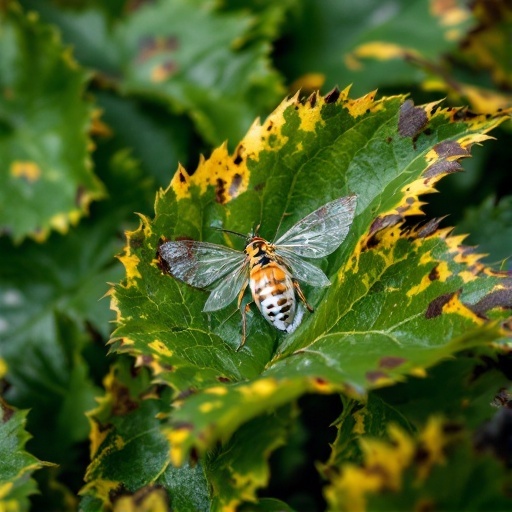
15 Effective Strategies to Eliminate Garden Pests
Tired of pests munching on your plants and ruining your garden? Fear not! We’ve compiled 15 practical and effective strategies to help you reclaim your garden and keep those pesky invaders at bay. From natural remedies to simple traps, you’ll find plenty of options to take control of your outdoor space without resorting to harsh chemicals. Let’s dig right in!
Homemade Organic Pest Sprays
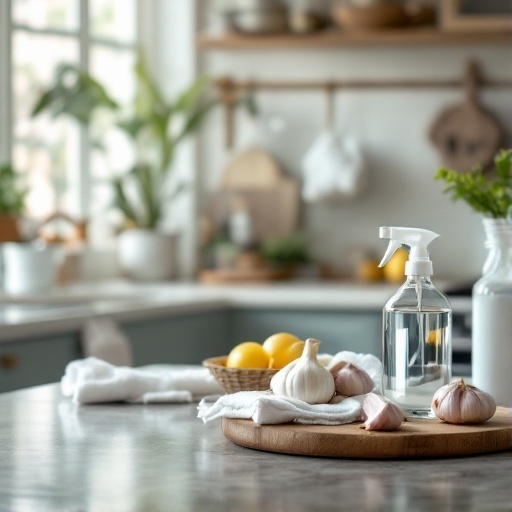
Creating your own homemade organic pest sprays can be a fun and effective way to tackle garden pests. The image shows a clean kitchen space, with fresh garlic and lemons—two common ingredients for natural pest control. Using these ingredients not only helps keep your garden free from bugs but also promotes a healthier growing environment.
Garlic is known for its strong scent that repels many insects. It can be crushed and mixed with water to create a simple spray. Just blend a few cloves with water, strain the mixture, and pour it into a spray bottle. This DIY pest control method is not only easy but also aligns with natural garden pest control approaches.
Lemons, on the other hand, can add a nice citrus scent to your spray while acting as a natural pesticide. Simply mix lemon juice with water and a bit of soap to help the solution stick to plant leaves. This mixture can deter aphids and other unwanted pests. If you’re wondering how to get rid of ants in the yard, this mixture can help as well.
For those looking for insect repellent plants, consider using a combination of garlic and lemon in your garden. They not only serve as DIY pest control but also enhance your garden’s overall health. Keeping your garden pest-free doesn’t have to be a chore—just grab some kitchen essentials and get started with these natural pesticides for your plants!

Encouraging Beneficial Insects
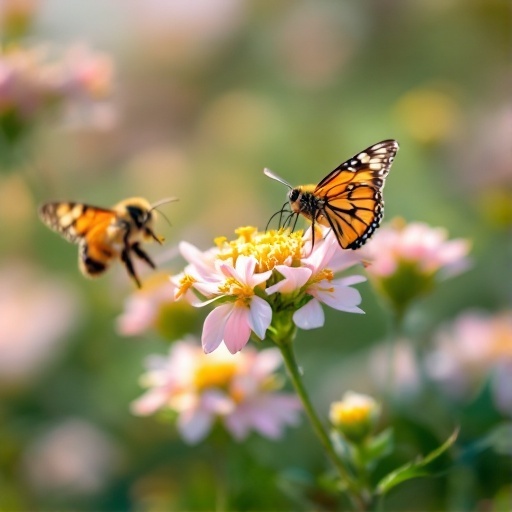
Your garden can thrive when you invite beneficial insects to join the party. Just look at the beauty of butterflies and bees in this image; they are perfect examples of nature’s little helpers. These insects not only add charm to your garden but also play a critical role in pollination and pest control.
Instead of reaching for chemical pesticides, consider creating a welcoming environment for these friendly creatures. Planting insect repellent plants can attract pollinators while keeping harmful pests at bay. Some popular options include marigolds and lavender.
How to keep bugs out of your garden can be tricky, but understanding the role of beneficial insects makes it easier. You can also introduce natural pesticides for your garden that are safe for these helpful critters. This approach to garden pest control not only keeps your plants healthy but also encourages a balanced ecosystem.
Additionally, if you’re dealing with ants, learning how to get rid of ants in the yard naturally can be beneficial, as many beneficial insects can help manage their populations. Embracing these natural allies in your garden leads to a healthier, more vibrant space.
Physical Barriers Against Pests
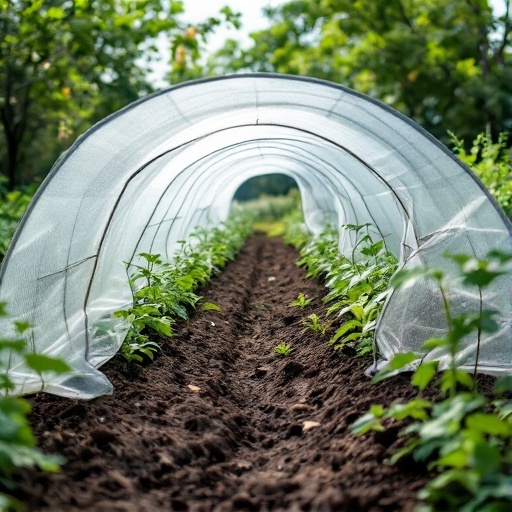

One of the simplest and most effective ways to protect your garden is by using physical barriers. In the image above, you can see a protective cover over rows of plants. This kind of setup helps to keep pests away while allowing sunlight and water to reach your plants.
Using row covers, like the one shown, is a great DIY pest control method. They create a safe environment for your plants, preventing insects from getting in. This is especially useful for small seedlings that are vulnerable to attack. If you’re wondering how to keep bugs out of the garden, this is a solid approach.
Another option for physical barriers is using mesh netting or fine screens. These can be draped over plants or set up as fences to deter larger pests like birds and rabbits. Incorporating insect repellent plants in your garden can also add another layer of defense. Together, these strategies create a robust system of natural garden pest control.
When setting up these barriers, make sure they are secured properly to withstand wind and remain effective. If you’re interested in natural pest control for home gardens, consider combining these barriers with natural pesticides for garden use. You’ll create a healthy space that not only protects your plants but also nurtures them.
Organic Insecticidal Soaps
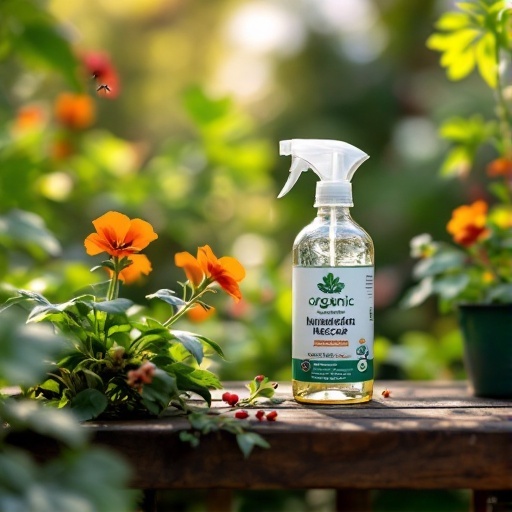
If you’re looking for a friendly way to tackle those pesky garden pests, organic insecticidal soaps are a solid option. These soaps are specifically designed to target and eliminate unwanted bugs without harming your plants or the environment.
The image shows a bottle of organic insecticidal soap nestled among vibrant flowers. This visual perfectly captures the essence of natural pest control for home gardens. The bright colors of the flowers highlight the beauty of your garden, while the soap stands ready to help keep it pest-free.
Using organic soaps is straightforward. Simply spray the affected areas of your plants, ensuring you cover both the tops and undersides of leaves. The soap works by suffocating soft-bodied insects like aphids and spider mites. It’s a great way to incorporate DIY pest control into your gardening routine.
For those who want to explore natural pesticides for garden use, insecticidal soaps can be mixed with ingredients like essential oils for added effectiveness. This way, you can customize your pest-fighting solution. Pairing this method with mosquito-repelling plants can create a comprehensive approach to garden pest control.
So, whether you’re dealing with a small ant problem or larger insect invasions, organic insecticidal soaps offer a friendly and effective solution to keep bugs out of your garden. Give it a try, and watch your plants thrive!
Natural Predators in the Garden
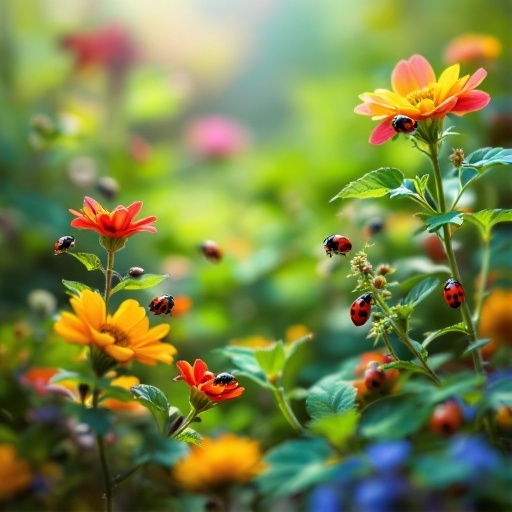
Your garden can thrive beautifully with the right balance of nature. One way to achieve this balance is by introducing natural predators that help keep pesky insects in check. The image above showcases ladybugs, a classic example of beneficial insects that can significantly contribute to your garden’s health.
Ladybugs are more than just charming little beetles; they’re known for their appetite for aphids and other common garden pests. If you’re wondering how to keep bugs out of the garden, these little helpers are a great start. They consume hundreds of pests daily, making them an effective part of any natural garden pest control strategy.
Encouraging these insects into your outdoor space can be as simple as planting insect repellent plants alongside your flowers. Marigolds and nasturtiums not only beautify your garden but also attract ladybugs and other beneficial insects. This creates a natural pest control environment, reducing the need for chemical pesticides for plants.
If you’re diving into DIY pest control, consider creating a habitat for these predators by having a diverse range of plants. This diversity will attract various beneficial insects that can further assist in garden pest control. Remember, a healthy ecosystem will help manage pests naturally, allowing you to enjoy a flourishing garden.
In addition to ladybugs, other natural predators like lacewings and predatory wasps can also provide effective pest management. By incorporating these elements into your garden care routine, you’ll embrace a more eco-friendly approach to gardening.
Essential Oils for Pest Deterrence

In the image, we see an assortment of bottles filled with various essential oils, surrounded by lush greenery and vibrant flowers. This setup perfectly captures the essence of using natural ingredients to keep pests at bay. The clear glass bottles highlight the natural approach to pest control, which many gardening enthusiasts are embracing.
Essential oils are a simple and effective way to deter pests in your garden. Many oils come from plants known for their pest-repelling properties, making them a great choice for natural garden pest control. Oils like peppermint, lavender, and tea tree are popular for their ability to repel mosquitoes and other insects.
To create your own DIY pest control spray, combine a few drops of your chosen essential oil with water and a mild soap. Shake it well and spray it directly onto the plants. This method not only helps keep bugs out of the garden but also adds a pleasant scent.
Using essential oils is part of a broader strategy for garden pest control. Incorporating mosquito-repelling plants around your garden, like citronella and marigold, can enhance your efforts. Combining these plants with natural pesticides for the garden creates a holistic approach to keeping pests away.
If you’re looking for ways on how to get rid of ants in the yard, consider using peppermint oil. Just a few drops in areas where ants are active can help deter them effectively. Overall, essential oils provide a chemical-free solution that aligns with a natural pest control for home and garden.
Traps for Specific Garden Pests
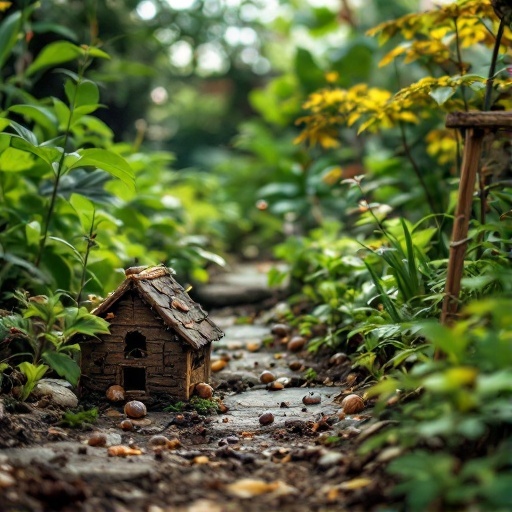
When it comes to dealing with garden pests, specific traps can be your best friends. The image above shows a charming little wooden house nestled in a lush garden, surrounded by vibrant greenery and delicate flowers. This whimsical scene not only adds to the garden’s aesthetic but also serves as a reminder that traps can blend into your natural surroundings.
Setting up traps in your garden can be an effective way to manage pests like ants or snails without relying heavily on chemical pesticides. For instance, if you’re wondering how to get rid of ants in the yard, a simple DIY ant trap can be made from common household ingredients. Just mix sugar and baking soda in equal parts, place it in a small container, and set it near ant trails. The sweetness attracts them, while the baking soda can help control their population.
Another effective method for natural pest control for home gardens is to use insect repellent plants. These plants can deter pests naturally without harming beneficial insects. You can plant varieties like mint or marigolds throughout your garden to keep those unwanted visitors at bay.
Don’t forget about those pesky mosquitoes! Incorporating mosquito-repelling plants like lavender or citronella can create a more enjoyable outdoor space, especially during summer evenings. By combining traps and repelling plants, you’ll discover how to keep bugs out of the garden while enjoying a peaceful, pest-free environment.
Companion Planting Strategies

Companion planting is a simple yet effective way to manage pests in your garden using nature’s own tools. The image around us showcases a vibrant array of plants, with marigolds, basil, and other greenery coming together beautifully. This colorful display is not just pleasing to the eye, but it also plays a vital role in keeping pests away.
When you pair certain plants together, they can naturally deter pests or even enhance each other’s growth. For instance, marigolds are known for their pest-repelling abilities, making them a great choice for any garden. By planting them alongside your vegetables, you can create a natural barrier against unwanted insects without relying heavily on pesticides for plants.
Additionally, some plants emit scents that confuse or repel harmful bugs. For example, basil is not only a delicious herb but also one of those mosquito-repelling plants. By incorporating it into your garden layout, you can enjoy its culinary benefits while also protecting your spaces from pesky mosquitoes.
This method of natural garden pest control is not just effective, but it’s also a sustainable approach. You can explore many combinations to find what works best for your specific garden. Think about how to mix and match based on your local pests. This DIY pest control method allows you to keep bugs out of your garden without using harsh chemicals.
If you’re looking to target specific pests, consider planting herbs and flowers that attract beneficial insects, such as ladybugs and lacewings. These friendly critters will help keep the bad bugs in check. With the right companion planting strategies, you can create a thriving garden that’s not only productive but also a haven for pollinators.
Crop Rotation Practices
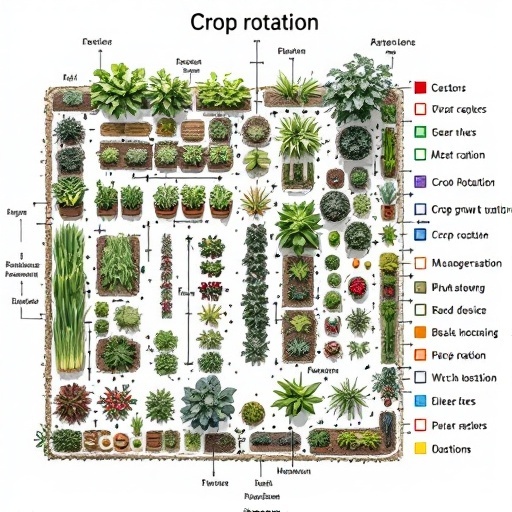
Crop rotation is a simple yet effective method for keeping your garden healthy and pest-free. This technique involves changing the types of crops you grow in a specific area each season. By doing this, you can reduce pest populations and improve soil health.
Take a look at the image showcasing various plants and their rotation. Each section indicates how different crops can be alternated. For instance, planting legumes one season can help restore nitrogen in the soil, while the next season might focus on leafy greens or root vegetables. This cycle not only benefits the soil but also disrupts the life cycles of pests.
If you’re wondering how to keep bugs out of your garden, crop rotation is a fantastic way to start. By regularly changing what you plant, you make it harder for pests to establish themselves. This means less reliance on natural pesticides for the garden and a healthier ecosystem overall.
Another benefit of crop rotation is the ability to introduce insect repellent plants into the mix. For example, planting marigolds or basil can help deter unwanted pests while you grow your vegetables. This method aligns perfectly with natural pest control for the home, as it promotes biodiversity in your garden.
So, next time you’re planning your garden layout, consider how to get rid of ants in the yard by incorporating a thoughtful crop rotation system. It’s an easy DIY pest control strategy that can yield beautiful, thriving plants.
Identifying Pest Damage Early
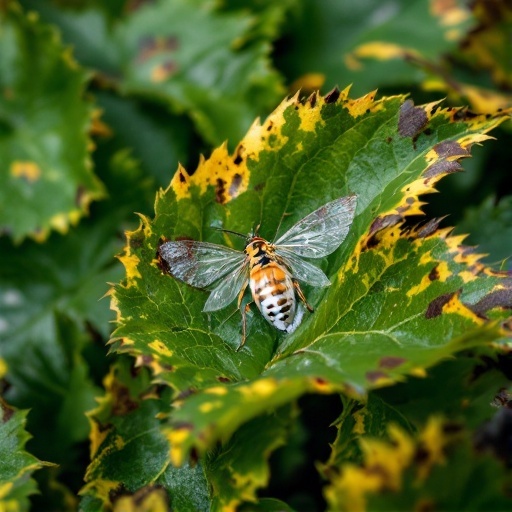
In the realm of gardening, spotting signs of pest damage can be crucial for maintaining a healthy environment for your plants. The image above showcases a pest resting on a leaf, a subtle reminder of the threats lurking in your garden.
When you notice unusual discoloration on leaves, like yellow patches or wilting, it’s time to investigate. This could indicate the presence of pests. Identifying these issues early helps you take action before they escalate. Using natural garden pest control methods can effectively target these unwanted visitors without harming your plants.
For instance, incorporating insect repellent plants around your garden can deter pests naturally. If you’re wondering how to keep bugs out of the garden, consider companion planting to create a balanced ecosystem. Additionally, natural pesticides for gardens, like neem oil, can protect your plants without harsh chemicals.
Learning how to get rid of ants in the yard is also essential, as they can transport other pests. Keeping an eye on your plants and acting quickly can make all the difference. By focusing on DIY pest control solutions, you can maintain a thriving garden while keeping those pesky insects at bay.
Using Diatomaceous Earth Effectively
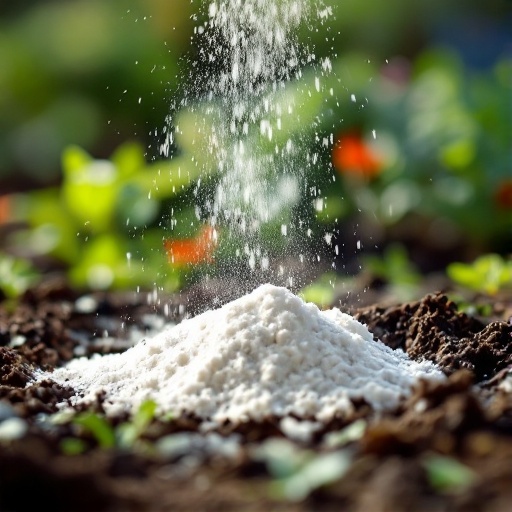
Diatomaceous earth is a natural powder that can work wonders in controlling garden pests. In the image, you can see the fine, white powder being sprinkled onto the soil, which is an effective method for applying this natural pest control solution.
This powder is made from the fossilized remains of tiny aquatic organisms called diatoms. When you use it in your garden, it acts as a physical barrier against various insects. The sharp edges of the particles damage the exoskeletons of pests like ants and beetles, leading to dehydration and eventual demise.
To use diatomaceous earth effectively, make sure to apply it in dry conditions. Wet conditions can reduce its effectiveness, so timing is key. Sprinkle a light layer around plants, especially targeting areas where you notice pests. This approach fits well with other natural pest control methods, like planting insect repellent plants, which can further enhance your garden’s defenses.
Incorporating diatomaceous earth into your garden routine is a simple way to improve your natural garden pest control strategy. It’s safe for humans and pets, making it a go-to option for DIY pest control enthusiasts. Just remember to reapply it after rain or heavy watering to maintain its effectiveness.
Overall, this natural pesticide for your garden is a great choice to consider if you’re looking to keep bugs out of your garden without relying on chemical pesticides. It’s one more tool in your gardening toolbox for preventing issues and keeping your plants healthy.
Regular Garden Inspection Habits

When you picture a healthy garden, you might imagine vibrant plants and buzzing bees. But it’s important to keep an eye on what’s happening beneath the surface. Regular garden inspections are key to maintaining a thriving space. The image shows a gardener focused on his plants, carefully checking for any signs of pests or disease.
Inspecting your garden frequently allows you to spot any unwanted visitors early. This proactive approach can save you a lot of trouble down the line. You’ll learn how to keep bugs out of the garden by identifying infestations before they spread. Plus, many bugs can be beneficial, so knowing the difference is crucial!
Use a simple checklist during your inspections. Look for discolored leaves, holes in foliage, and any unusual growth patterns. Keep an eye out for common pests like aphids or spider mites. If you do find them, consider DIY pest control options. Things like neem oil or soap sprays can be effective natural pesticides for the garden.
Another aspect to consider during your inspections is the presence of mosquito-repelling plants. Adding these to your garden not only enhances aesthetics but also helps keep those pesky bugs at bay. Plus, healthy plants are generally more resilient to pests, making regular care essential.
Maintaining Healthy Soil

Healthy soil is the foundation of any thriving garden. When you look at soil, like the rich, dark mix in the hands of a gardener, you see much more than dirt. This soil is alive with nutrients, microorganisms, and the potential for robust plant growth. By focusing on soil health, you can naturally reduce garden pests without chemical pesticides.
One way to maintain healthy soil is by incorporating organic matter, such as compost or aged manure. This not only enriches the soil but also helps improve its structure. A well-aerated soil allows roots to grow deeper and plants to access more nutrients. Plus, these practices can make it harder for pests to invade, helping you learn how to keep bugs out of the garden.
Another tip is to rotate your crops each season. This simple practice disrupts pest life cycles and reduces the risk of infestations. Certain plants can also deter pests naturally. For example, including mosquito-repelling plants like citronella or marigolds can create a barrier against unwanted insects.
Finally, understanding how to get rid of ants in the yard is part of maintaining healthy soil. Ants can protect harmful pests like aphids, so their presence can be a sign of a larger issue. By keeping your soil healthy, you give your plants the strength they need to thrive, making them less appealing to pests.
Seasonal Cleanup for Pest Prevention
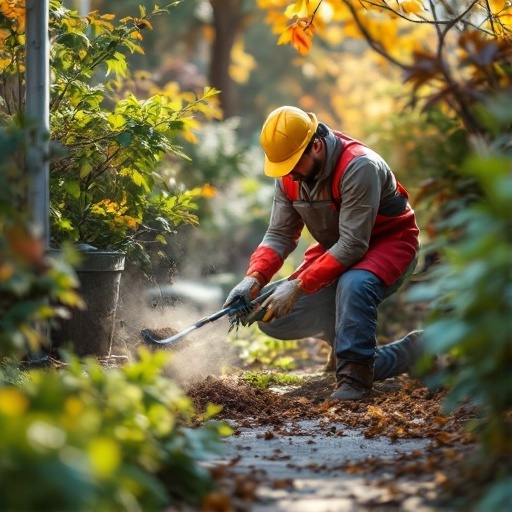
When it comes to keeping your garden healthy, seasonal cleanup is key. The image shows a dedicated gardener getting down to business, digging and tidying up the garden. This kind of work not only beautifies your space but also plays a crucial role in natural garden pest control.
As the seasons change, pests tend to thrive in debris and overgrown areas. By clearing away dead plants and fallen leaves, you reduce the hiding spots for insects. Many gardeners ask, ‘How to keep bugs out of the garden?’ The answer often starts with a good cleanup.
Consider incorporating some insect-repelling plants into your garden layout. These plants can help deter unwanted critters while adding beauty to your space. If you want to explore DIY pest control options, natural pesticides for gardens can be a great alternative to chemical solutions.
Don’t forget about your yard! If you’re wondering how to get rid of ants in the yard, a clean and organized space will make it easier to spot and treat any infestations. Keeping your garden neat not only makes it more enjoyable but also significantly aids in effective garden pest control.
Creating a Diverse Ecosystem
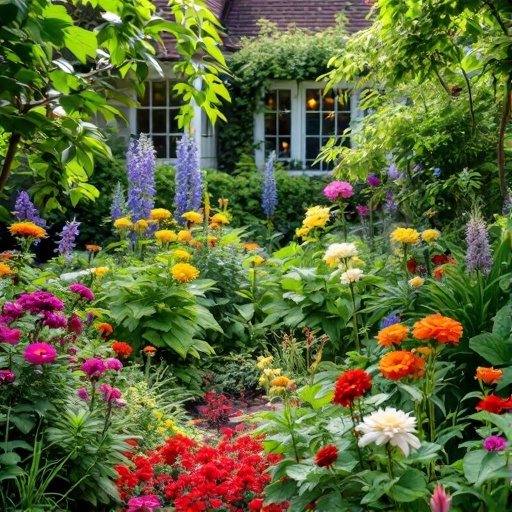
When it comes to keeping your garden thriving, creating a diverse ecosystem is key. Just look at this vibrant garden filled with a variety of flowers and plants. The colorful blooms not only look beautiful but also serve a purpose in natural garden pest control.
By planting a mixture of different species, you can attract beneficial insects that help keep garden pests at bay. For example, some plants naturally repel mosquitoes and other unwanted critters. Think about adding mosquito repelling plants like marigolds or lavender to your garden. These plants can also enhance your garden’s charm while providing natural pest control for home.
Additionally, incorporating insect repellent plants into your garden can create a more balanced environment. This diversity encourages a healthier ecosystem, which means your plants can thrive without relying solely on pesticides for plants. Instead of chemical solutions, you can explore natural pesticides for garden that are less harmful to the environment.
In a well-balanced garden, the presence of different plants can also help in managing ants and other common pests. Knowing how to get rid of ants in the yard becomes easier when you have a variety of plants that deter them naturally. Overall, a diverse ecosystem not only beautifies your space but also acts as a natural pest control system, making your gardening journey more enjoyable.
Leave a Reply